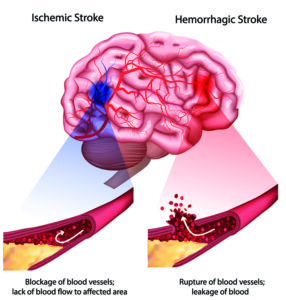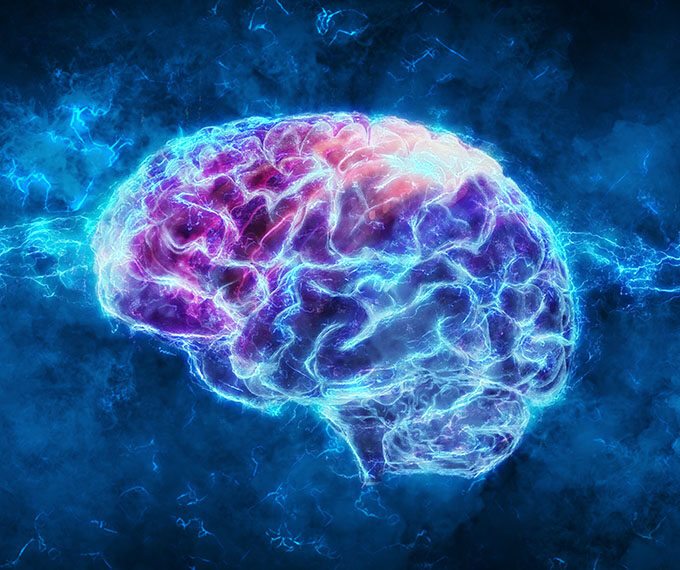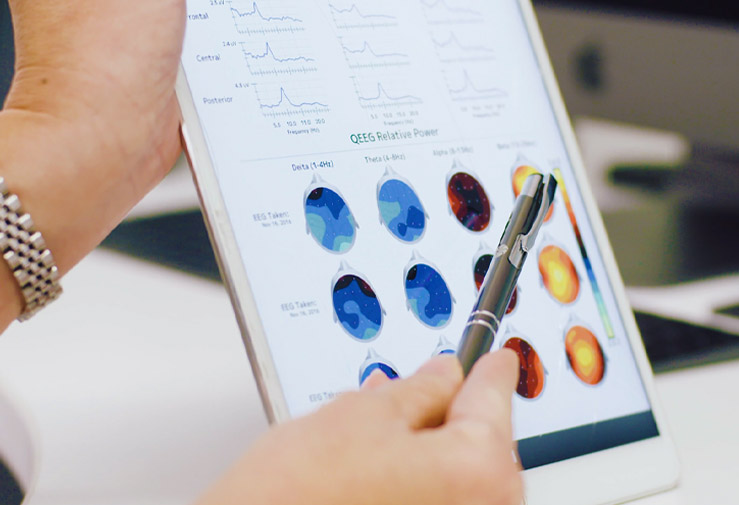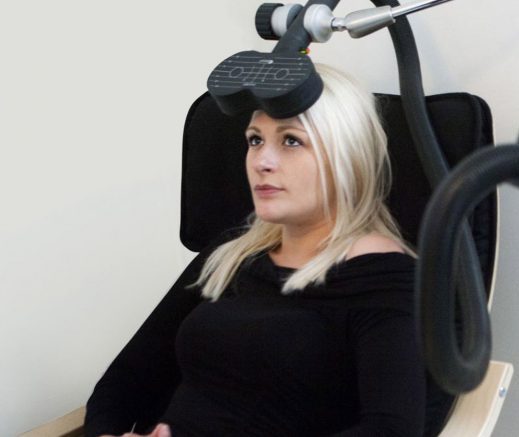A New, Innovative Stroke Recovery Treatment is Now Available at the Brain Treatment Center in San Diego
MeRT (Magnetic e-Resonance Therapy) is a non-invasive and drug-free way to help your brain heal.
We combine sophisticated diagnostic testing with targeted electromagnetic stimulation to balance brain communication.
We can perform MeRT alongside or after other stroke rehabilitation therapies.
MeRT: A Breakthrough Solution for the Challenges of Post-Stroke Recovery

The after-effects of stroke can include pain, numbness, weakness, balance problems, and more. These symptoms can make you feel frustrated and can lead to feelings of sadness or depression as you cope with the challenges of everyday life.
We understand. And we know how vital it is to do everything you can to help your brain heal and recover. That’s why we offer MeRT®, a breakthrough treatment to enhance brain function.
MeRT is an emerging technology that aims to improve brain function and communication. The TMS equipment used in MeRT is FDA-cleared to treat Major Depressive Disorder and OCD and is used off-label to treat a wide variety of neurological conditions.
We tailor our treatment to your unique brain situation using comprehensive and sophisticated EEG testing. Then we provide a precise program of targeted TMS (transcranial magnetic stimulation) to improve brain communication.
MeRT can be highly effective in treating post-stroke symptoms. And you can undergo MeRT treatment either with or after other stroke recovery therapies.
Call Our New Patient Coordinator to Learn More about MeRT for Stroke Recovery
Types of Stroke

Ischemic Stroke: This is the most common type of stroke, accounting for about 87% of cases. It occurs when a blood clot or plaque buildup obstructs or narrows a blood vessel supplying the brain, leading to a lack of blood flow and oxygen to certain areas. Ischemic strokes can result in brain cell damage or death.
Hemorrhagic Stroke: This type of stroke occurs when a weakened blood vessel ruptures or leaks, causing bleeding into the surrounding brain tissue. The most common hemorrhagic stroke is an aneurysm, when a blood vessel bursts due to uncontrolled high blood pressure.
Transient Ischemic Attack (TIA): Also known as a “mini-stroke,” a TIA is a temporary blockage of blood flow to the brain. It is considered a warning sign and lasts for a short period, typically less than an hour. Although TIAs do not cause permanent brain damage, they indicate an increased risk of a full-blown stroke in the future.
How a Stroke Affects the Brain and Body
The effects of strokes on the brain and body depend on various factors, including the type, severity, and location of the stroke. Strokes can lead to a range of physical, sensory, cognitive, and emotional impairments. Common effects include:
- Weakness or paralysis on one side of the body (hemiparesis or hemiplegia)
- Difficulty speaking or understanding speech (aphasia)
- Vision problems or loss of vision in one or both eyes
- Problems with coordination and balance
- Memory loss or difficulties with thinking and reasoning
- Emotional changes, such as depression, anxiety, or mood swings
- Fatigue and decreased energy levels
- Changes in sensory perception, such as numbness or tingling
- Swallowing difficulties
- Bowel and bladder control problems
Stroke Recovery and Neuroplasticity

Following this, the brain works to restructure and repair the damaged area by changing the connections in the brain. This process is known as neuroplasticity. In essence, the brain naturally rewires itself to function differently from how it previously functioned.
This neuroplasticity of the brain is why MeRT treatment can be so helpful in stroke recovery. By helping your brain do what it naturally wants to do, MeRT can help your brain generate new pathways around the damaged area.
MeRT can’t repair areas of the brain where brain cells have died, but it can help the brain create new pathways around the injured area. In this way, MeRT can help your brain do what it naturally wants to do so it can heal.
Is MeRT the Right Treatment for You?
We understand that MeRT is a relatively new treatment, and you may not be sure if this is right for your situation.
However, know that you do not have to make this decision right away or alone. Your first step is a simple phone consultation with our New Patient Coordinator.
During this free, no-obligation consultation, you can discuss symptoms and history, ask all the questions you want, and have her explain the protocols and fees. She can also further explain the treatment itself.
After the call, if you are interested in taking the next step, we can set up an appointment for a qEEG (a simple, painless, and non-invasive brain scan).
EEG/EKG Testing

The qEEG, or brain mapping, is a valuable tool that lets us customize your treatment. The qEEG/EKG testing is performed by our chief neuro technician and takes approximately 45 minutes.
We will also gather your new patient paperwork and get you scheduled for your initial assessment period of treatment.
Clinical Evaluation and Consultation
Your second appointment will be a clinical evaluation with Nurse Practitioner Kayleigh Prowse, which will take approximately 45 minutes. You can have this appointment via Telemedicine or in-clinic, whichever you prefer.
During this consultation, Kayleigh will answer all your questions and discuss your applicable treatment plan. Please be assured that Dr. Julie Kim oversees all care and treatment protocols.
Assessment Period

The assessment is two weeks long. It comprises ten treatment sessions, followed by a repeat qEEG and a consultation to review the results. We provide treatment in the first and second weeks, Monday through Friday. A typical treatment session lasts about 30-45 minutes.
For those not ready to commit to an assessment period or if we need to see the testing results to confirm that MeRT can help, we also offer the option of coming in for a qEEG/EKG and then having a consultation with Kayleigh to go over the results.
After your clinical consultation, you will still have the option of going through an assessment period should you choose to do so.
Continuing Treatment
If clinical changes are occurring as they should and the qEEG also shows progress, you will then continue treatment. This ongoing treatment occurs five days per week, Monday through Friday.
Generally, you will begin to feel the benefits of treatment within a week or two and continue to note improvements throughout the course of your treatment — and even for some weeks after. Because treatment is consecutive, you must be able to stay in or around the San Diego area while undergoing your therapy.
Because each person’s brain and condition are unique, we customize treatment protocols specifically for you, guided by the qEEG results. We perform repeat qEEGs and provide clinical consultations every two weeks throughout the treatment.
As a note, the potential side effects of treatment are minimal and should begin to dissipate as you progress through treatment. The effects of treatment generally last a lifetime, though some patients prefer occasional follow-up treatment as needed.
Improvements and results of MeRT are based on strict and active observation of our treatment protocols. Results may vary based on each person and are not guaranteed.
Contact Our New Patient Coordinator for More Information

If, after talking to her, you are interested in further exploring whether you could benefit from MeRT, the next step would be to schedule your EEG and a consultation.
With thorough diagnostics, we can show you what is happening in your brain and what may be causing the issues you are experiencing.
At this point, we can determine whether you may benefit from MeRT treatment, and you can decide if you would like to move forward.
Call Our New Patient Coordinator to Learn More
(619) 255-2101
Or fill in the form below, and she will contact you.
Contact Us
For more information or to speak with our New Patient Coordinator, please fill in the information below.
Contact Us
For more information or to speak with our New Patient Coordinator, please fill in the information below.
Insurance Coverage
 We are an in-network provider with TRICARE. If you have TRICARE insurance, it is possible that your policy may provide coverage for you or a family member, depending on your specific policy and condition. Our New Patient Coordinator can discuss this with you in further detail.
We are an in-network provider with TRICARE. If you have TRICARE insurance, it is possible that your policy may provide coverage for you or a family member, depending on your specific policy and condition. Our New Patient Coordinator can discuss this with you in further detail.

